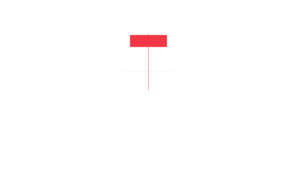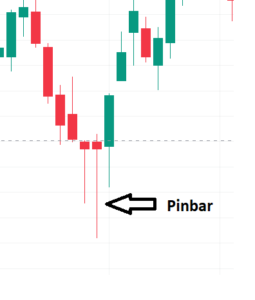What is a Pin Bar?
- Appearance: A pin bar is a single candlestick with a small body and a long wick (also called a shadow or tail). The long wick resembles the nose of Pinocchio, hence the name.
- Signaling: Pin bars are primarily reversal patterns, suggesting a potential shift in market sentiment.

Types of Pin Bars:
- Bullish Pin Bar:
- Long lower wick (tail) and a small body
- Indicates that sellers were in control but buyers pushed the price back up significantly near the end of the period.
- Suggests potential bullish reversal.
- Bearish Pin Bar:
- Long upper wick (tail) and a small body
- Indicates buyers dominated early but sellers pushed the price down significantly near the end of the period
- Suggests a potential bearish reversal.
Key Characteristics of a Good Pin Bar:
- Wick length: The wick or tail should be at least two-thirds the length of the overall candlestick.
- Nose/Shadow: The opposite side of the pin bar (nose or small shadow) should be relatively small.
- Context: Stronger pin bars generally form at important price areas like support/resistance levels or within established trends.
How to Trade Pin Bars:
Pin bars, by themselves, don’t offer a complete trading strategy. Here are ways to use them:
- Trend Reversal Signal: Look for pin bars forming at the end of a trend, especially near key support/resistance zones.
- Trend Continuation: Pin bars that form with the direction of the current trend can signal a potential continuation.
- Confluence: Combine pin bars with other technical indicators like:
- Moving Averages
- Trendlines
- Oscillators (RSI, MACD)

Important Notes
- Pin bars are not foolproof. Sometimes they fail, leading to false signals.
- It’s essential to manage risk using stop-losses when trading with pin bars.
- Always consider the overall market context and broader trend before taking a trade based on a pin bar pattern.

Leave a Reply